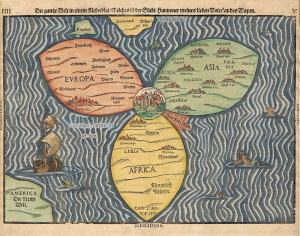By Mary Fairchild
1581 Bunting Clover Leaf Map; Israel in the center.
The narrative of Daniel begins 19 years before the final fall of Jerusalem. Daniel and his friends, Hanniah, Mishael, and Azariah, had been taken from Jerusalem by Nebuchadnezzar after he defeated Pharoah-nechoh of Egypt of Egypt. Select young men from Jerusalem were taken by Nebuchadnezzar along with the best from Judah—the king, and part of the Temple treasures. The young men, teenagers, were the finest young men Judah had; they were superior physically, mentally, and socially—well-qualified for three years of Chaldean training. Their Hebrew names, which had related to God, were changed to names relating to Babylonian gods. The man in charge of the young Jewish boys, the prince of the eunuchs, gave them all Chaldean names:
1) Daniel (God is judge) became Belteshazzar (keeper of the treasure of Baal).
2) Hananiah (grace of the Lord) became Shadrach (inspiration of the sun).
3) MIshael (He that is the strong God) became Meshach (of the goddess Shach).
4) Azariah (The Lord is a help) became Abednego (servant of the shinning fire).
Deciding to be loyal to the God of Israel (Daniel 1:8): The Lord meant more to Daniel and his friends than food, more than favor with their superiors, more than acceptance from peers, and even more than life itself. This decision, made from Daniel’s heart, determined his destiny. God would not prepare him for purposes far more spectacular than the plans of Nebuchadnezzar could have imagined. Other young Jewish boys ate the royal food, probably thinking that since they had no choice, they therefore had no individual responsibility in their position of submission to Nebuchadnezzar.
Daniel did not go on a hunger strike or protest in any way—he politely asked the prince of the eunuchs that he and his three friends be excluded from eating the king’s meat. Understandably, the prince feared to obey Nebuchadnezzar. Daniel wisely suggested an alternative—that Daniel and his friends have a stew of vegetables and water for 10 days, after which the prince of eunuchs could compare their appearance and health with those who had eaten the king’s menu. “….their countenances appeared fairer and fatter in flesh than all….” These young men were learning the power of prayer and the rewards of a pure conscience.
Daniel 1: 17-20: God not only gave these faithful young men physical fitness, but He gave them excellence in academics and understanding. And He gave to Daniel the ability to interpret dreams. The final exams in the three-year course were oral and were given by King Nebuchadnezzar himself. As a result of this examination, Daniel, Hananiah, Mishael, and Azariah were the top students selected to serve before the king. Although they were undoubtedly ridiculed for their separation of diet by the compromising Jewish boys—now they were rewarded by Nebuchadnezzar. As they worked in Nebuchadnezzar’s government, God gave them knowledge and skill which rated them ten times better than all the wise men in Babylon.
Daniel served more than 70 years under four kings and during two world empires, Babylon and Persia. He never compromised with the gods of the heathen empires. Since oriental kings were capricious and ruthless, a citizen might step from prominence to obscurity in a moment, but Daniel continued because he was consistently loyal to his God. God rewarded that loyalty by showing Daniel His viewpoints on many things.
OUR DECISIONS DETERMIN OUR DESTINY. The three most important decisions of life are:
1) our salvation
2) our life’s partner
3) our life’s occupation
WORKS CITED
- Revelation and Church History
- Church Age
- Old Testament Study
- KING JAMES BIBLE
- MATTHEW HENRY COMMENTARY
- A Beka Book High School Bible Series “United Kingdom: Kings of Israel A;” 1995 Pensacola Christian College; www.abeka.com

